After a break of some fifteen years I decided this year that I would start playing bridge again, but in a more serious fashion than previously and targeting the main competitions around the world. My core team has been me, Willie Whittaker, Derek Patterson and Gunnar Hallberg – earlier this year we went out to Tokyo and competed in the NEC Cup. In the Spring Foursomes last week our team is augmented with the excellent father and son pairing of Morten and Dennis Bilde from Denmark.
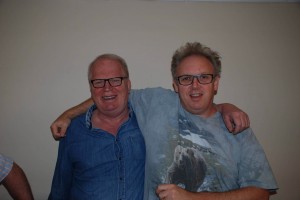
.
.
I play throughout with Gunnar – he is a long time master of the game, originally from Sweden and now living in Brighton;
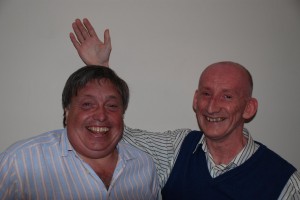
.
.
.
Will plays with Derek – they are a long term successful pairing. Derek lives a busy life in Kent and among other things runs Chislehurst Bridge Club. Will is originally from Scotland but has lived in London for many years.


.
.
.
Dennis and Morten live on a farm in a small village in Denmark. Morten and his wife Dorthe both played internationally for Denmark, and Dennis is a young player of enormous talent on the world stage.
.
.
.
.
.
.
.
.
.
.
.
.
.
.
The event starts at 4:30 on Friday; I take a taxi to the hotel as I am not feeling great and I want to save my energy. I arrive an hour before the start at the Holiday Inn at Stratford to find the team in the restaurant. The venue is perfect – spacious and with a nice outdoor area. We decide that to start with we will play the Bildes throughout and Gunnar and I will alternate with Will and Derek as the other pair.
There is an incredibly strong lineup for the event, including the italian world champions sponsored by Maria Teresa Lavazza. We are drawn in a ‘triangle’ – we are simultaneously playing two other teams. Our opponents are ‘Nonnenmacher’ – essentially the England junior team – and ‘Collins’ – a very solid UK team. I have a headache and I know I won’t be at my best, but I feel I need to get playing. Gunnar and I play the first and third stanzas and Will and Derek the second and fourth – all goes well and we head off to our rooms later nicely up in both matches.
I wake up on Saturday and I still have a dull headache – it won’t kill me but I wont be sharp. We resume the same format after breakfast and maintain our lead in both matches before closing them out in the early afternoon session. I haven’t played well – one hand I was in four hearts and I played thinking I was in 3NT, going off in a cold contract. It’s the sort of thing I do when I don’t have a clear head. We find ourselves drawn against ‘Hinden’ – one of the best teams in the UK, and the team that essentially ended our hopes in Japan. It’s a tough draw but I’m pleased to be playing them.
Unfortunately we get off to a terrible start, and I am to blame – I bid a couple of unmakeable slams. They are tough competitive auction situations, but my judgement is poor. As the match goes on we nearly pull back to level, but the late hands go against us and we end up losing by 15 IMPs. You can lose once in this tournament but the second time you lose you are out – we need to play well now.
In the evening we go down to the Lazy Cow Steakhouse for some serious carnivorous action. I have an amusing discussion with the waitress over whether she prefers longhorn or shorthorn meat. We eat like men and head back to the hotel at midnight – I go to bed while Dennis and some of the others head to the bar with a sense of purpose.
I wake up with a clear head – the steak seems to have put me right. After a light breakfast and a short walk we resume, and we are drawn against ‘Hasenson’, a London based team that we know well. Derek is captain – I tell him that I want to play more hands today as I still feel short of match practice – we agree that I will play in the first three stanzas. Gunnar and I play against Peter Hasenson and David Sherman throughout – an interesting hand comes up early in the first set;
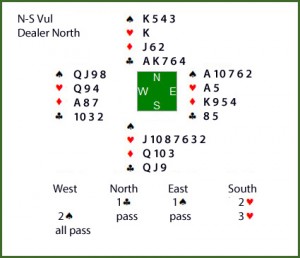
West (Peter) leads the Spade Queen against three hearts; I ruff and play a Heart. East (David) wins and plays a diamond to his partner’s Ace. When a diamond is returned I play low from dummy, and East also plays low – this is very good play. I sense I am in trouble now, but I choose to plod on with the Jack of Hearts. West wins, plays a diamond to his partner’s King and the thirteenth diamond promotes the nine of hearts for the setting trick.
It’s an excellent defence, but I had the opportunity to counter it. When Peter played the second diamond I should have played the Jack from dummy – when this is ducked I should now have played a Spade, throwing my last diamond and cutting communication between the defenders. This play is termed a ‘Scissors Coup’, and it’s a shame that I missed it.
Despite this poor hand the first two sets go well, and we have a nice lead at lunch. In the first afternoon session the Bildes sit out – Gunnar and I have an excellent session, bidding and making three marginal slams in the space of five hands. Two of the slams are in Six Diamonds, and these good looking slams are not only missed at the other table but also seemingly by most of the room;
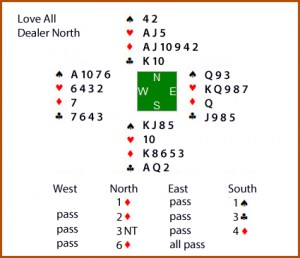
The King of Hearts is lead and Gunnar claims twelve tricks immediately – there is only danger on a Spade lead, and as the cards lie declarer is most unlikely to go wrong. I decided not to disclose my diamond support for a couple of rounds, and this proved effective – Gunnar was certain that I was short in hearts and I had promised enough in the right places elsewhere to make him confident that 12 tricks were there.
This slam is not so easy to find if our opponents get busy in the auction. If the auction starts 1D – 1H – dbl – 2H then I suspect that we will still get there. If it starts 1D – 1H – dbl – 3H then I suspect that we won’t.
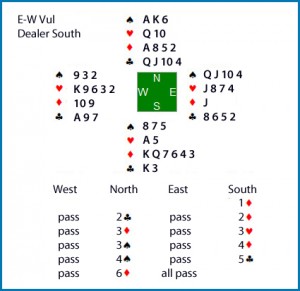
This auction was a lot more delicate, and for Gunnar the critical bid was 5 clubs. Once he knows I have a top honour in clubs then he can count twelve tricks – I will never get to twelve as my hand has too many gaps to fill. I couldn’t say for certain that I would not make the bid in clubs with a singleton, but if I did I would be certain to have values elsewhere – Gunnar and I prefer not to open on tram tickets.
It takes a Heart lead to worry declarer, and if that had been the lead (it wasn’t) I suspect I would have called for the Queen. We didn’t use Blackwood in any of the three slams, which I think is a great positive.
At the end of the third stanza we are 50 IMPs up against Hasenson – Gunnar and I sit out for the fourth where they make a bold effort to close the gap, but that was never likely and we end up winners by 27 IMPs. In the fifth round we draw ‘Mossop’, which includes the Hackett twins and Price and Simpson. In the first stanza Gunnar and I take on David Mossop and Jason Hackett.
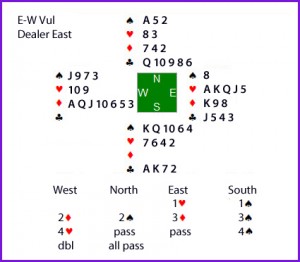
Once my partner supports my spades I instinctively want to play he hand, but ideally I want to hear a little more about the heart suit first. Passing over three diamonds surely allows the oppo too much space, and jumping to four spades not only feels risky, but also I don’t think it gives me the best chance of buying the contract. My three spade bid works well – it compresses the auction and when four spades is doubled I am pleased to be in it.
The defence cashes two hearts, and then switches to diamonds. I ruff, ruff a heart in dummy and lead a small club. I put my cards face down in front of me, cross my arms and have a think.
This is an interesting hand. On the face of it I can pick up the clubs, but I don’t have the entries I need to get to the fifth club if they turn out to be 4-0 – the only way to cope with a bad break is to finesse the seven now on the first round of the suit. There are plenty of reasons to believe that the clubs are in fact 4-0, and if they aren’t it is still highly likely that the club finesse will work. Sadly, after a long think, I decided to play the Ace – a few tricks later I was one down.
I’m not really sure why I didn’t finesse – I think I was worried about looking stupid, but that is a very poor reason to base a decision on. Whatever the case one down was still a very good score as there is a red suit slam on the other way. We quickly established a significant lead against Mossop and they conceded after three stanzas.
In the sixth round we found ourselves up against he very strong ‘De Botton’ team. Gunnar and I played first and third – we got off to a good start, finishing the first stanza 17 IMPs up. the team had a very narrow loss in the second – in the third we found ourselves up against Tom Townsend and Nick Sandqvist, and this hand came up;
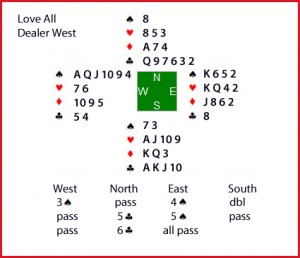
Our opponents are aggressive bidders, and my one decision in the hand comes at the five level. The way that Gunnar and I play it there is not a huge amount of difference between doubling and passing at this point, but doubling would nonetheless suggest a preference to defend. I have a few cards I don’t have to have, including honours in my partner’s suit – I choose to pass, and thus pass the buck. Gunnar has his deepest think of the tournament – after about a minute the fire alarm goes off, which is not helpful. Eventually he chooses to bid six clubs, which has no play.
We are still up after the third stanza, but only by two IMPs. In the last stanza seven of the eight boards are flat, and the eighth goes against us – we lose by 11 IMPs. It is a blow – we had four significant wins and two narrow losses. I spend an hour or so commiserating with my team mates and then head home to see my family.
General comments on the tournament; It had a really good feel to it with a fantastic field turning up to play. The venue was perfect and the EBU were very helpful in helping us get organised beforehand. In other respects however I thought it fell short, in particular if I compare to my experience at the NEC Cup in Japan.
At the NEC Cup we had screens throughout and side tables; the stewards were efficient but always good humoured, and on occasion that was not the case at Stratford; There was a daily bulletin with analysis beautifully written each day by Richard Colker and Barry Rigal, available first thing in the morning in print and also online. There was a small team of youngsters always on hand to clear away rubbish and keep the event running in a smooth and tidy fashion; There was full data available on all hands played, and also butler scores for all players available almost immediately; Right from the start there were teams playing on BBO vugraph, with various screens dotted around so that we could follow the action.
It felt like the Spring Pairs was administered like any other tournament in the UK, but could be bigger and better than that, and I think a lot of the participants would want it that way. If the event is to attract a strong field each year, in my opinion it needs to stand out a bit more than it does at the moment.